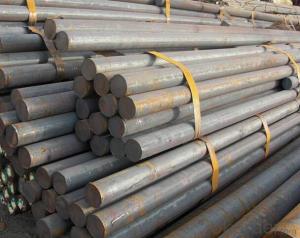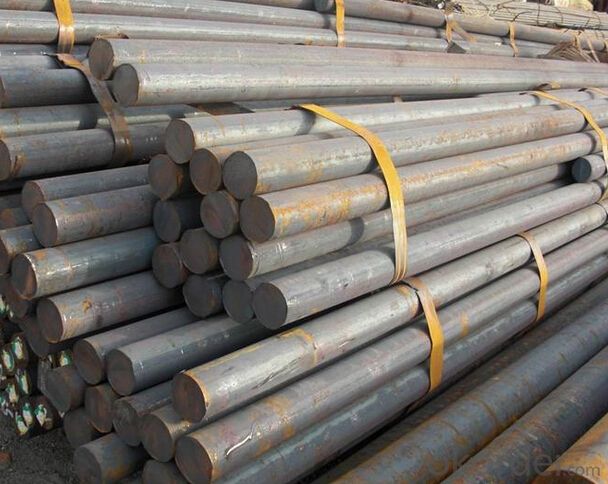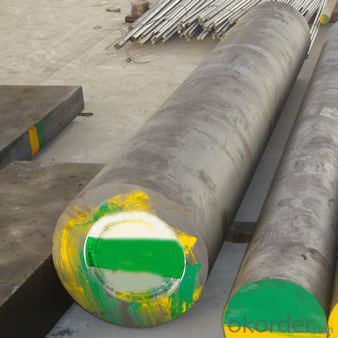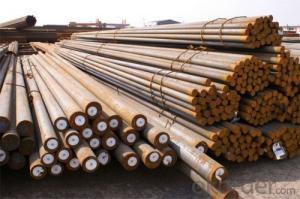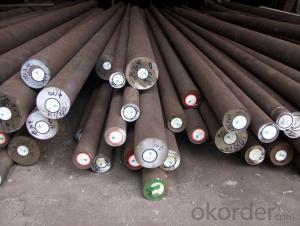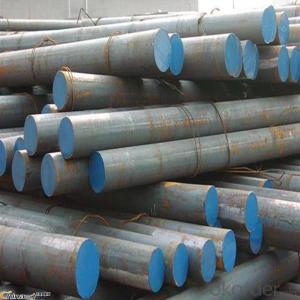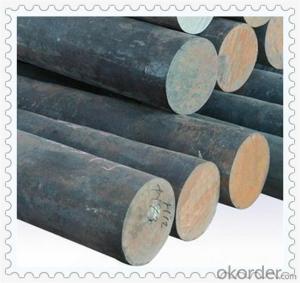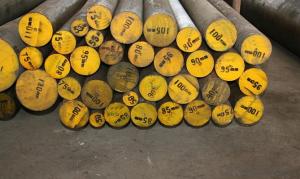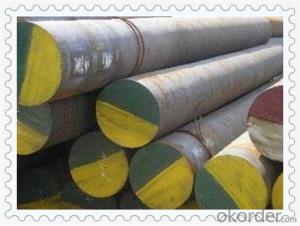Special Steel AISI 4140 Round Bar Steel
- Loading Port:
- China main port
- Payment Terms:
- TT OR LC
- Min Order Qty:
- 25 m.t.
- Supply Capability:
- 10000 m.t./month
OKorder Service Pledge
OKorder Financial Service
You Might Also Like
Specification
Chemical Composition(%)
| C | Si | Mn | Cr | Mo | Ni | P | S |
| 0.38-0.45 | 0.17-0.37 | 0.50-0.80 | 0.90-1.20 | 0.15-0.25 | ≤0.030 | ≤0.030 | ≤0.030 |
Standard
| GB | AISI | DIN | JIS | ISO |
| 42CrMo | 4140 | 42CrMo4 | SCM440 | 42CrMo4 |
Available Size
| Rolled round bar | φ20-120mm × L |
| Forged round bar | φ130-195mm × L |
Heat Treatment
| Item | Temperature℃ | Hardness |
| quenching | 840-880 | HRC32-34 |
| tempering | 580 | |
| quenching | 900 | HRC54-60 |
| tempering | 150-180 |
Characterstics
| The steel with high strength and toughness, hardenability is better also | |||||||
| After conditioning treatment quenching deformation of small | |||||||
| high fatigue limit and repeated impact resistance |
Applications: The steel is suitable for manufacturing requires a certain strength and toughness of large and medium-sized plastic mold


1, Your advantages?
professional products inquiry, products knowledge train (for agents), smooth goods delivery, excellent customer solution proposale
2, Test & Certificate?
SGS test is available, customer inspection before shipping is welcome, third party inspection is no problem
3, Payment Terms?
30% TT as deposit and 70% before delivery.
Irrevocable L/C at sight.
4, Trading Terms?
EXW, FOB, CIF, FFR, CNF
6, After-sale Service?
WE provides the services and support you need for every step of our cooperation. We're the business partner you can trust.
For any problem, please kindly contact us at any your convenient time.
We'll reply you in our first priority within 24 hours.
- Q: Can special steel be used for making aerospace engine components?
- Certainly, aerospace engine components can be made using special steel. The aerospace industry commonly utilizes special steel alloys, such as nickel-based superalloys and stainless steels, due to their remarkable mechanical properties, ability to withstand high temperatures, and superior resistance to corrosion. These alloys are specifically engineered to endure the extreme conditions and demands of aerospace engines, including high temperatures, pressures, and stress levels. Moreover, special steel alloys offer a high strength-to-weight ratio, which is crucial in reducing the weight of aerospace components while preserving their structural integrity. Consequently, the utilization of special steel in aerospace engine components ensures the dependability, performance, and safety of engines in aeronautical applications.
- Q: How does special steel perform in cryogenic environments?
- The performance of special steel in cryogenic environments is exceptional. Cryogenic temperatures, which are temperatures below -150°C (-238°F), require materials that can withstand and excel in such extreme conditions. Special steel is specifically designed to possess these qualities. One of the key characteristics of special steel is its ability to maintain its strength and toughness even in low temperatures. Unlike other materials that become brittle and prone to fractures in cryogenic environments, special steel retains its mechanical properties, ensuring the structural integrity and reliability of equipment or structures. This is particularly important in industries where safety is of utmost importance, such as aerospace and nuclear. Furthermore, special steel exhibits excellent resistance to corrosion and oxidation, even at cryogenic temperatures. This resistance is crucial as cryogenic environments often involve the presence of gases, liquids, or chemicals that can accelerate corrosion. By resisting corrosion, special steel ensures its longevity and minimizes the risk of material degradation, thereby enhancing the overall performance and lifespan of equipment or structures. Apart from its mechanical and corrosion-resistant properties, special steel also possesses good thermal conductivity. This property enables efficient heat transfer, which is critical in cryogenic environments where temperature control and management are vital. Special steel's ability to efficiently conduct heat ensures that equipment and structures remain at the desired low temperatures without any significant thermal variations. Moreover, the suitability of special steel for cryogenic environments is evident in its wide range of applications. It is commonly used in cryogenic storage tanks for liquefied gases like liquid oxygen, nitrogen, and argon. It is also utilized in the construction of cryogenic pipelines, valves, and other components, where its exceptional performance guarantees the safe transport and containment of cryogenic fluids. In conclusion, special steel performs exceptionally well in cryogenic environments due to its retained strength and toughness, resistance to corrosion, good thermal conductivity, and wide range of applications. Its ability to withstand extreme cold temperatures makes it a reliable and preferred choice for various industries that require dependable performance in cryogenic conditions.
- Q: What are the different corrosion protection techniques used for special steel?
- There are several corrosion protection techniques used for special steel, including: 1. Coatings: Special steel can be coated with a variety of protective materials such as paints, epoxy, or other barrier coatings. These coatings act as a physical barrier between the steel and corrosive elements, preventing direct contact and potential damage. 2. Cathodic protection: This technique involves the use of sacrificial anodes or impressed current systems to protect the steel. Sacrificial anodes, typically made of zinc or aluminum, corrode instead of the steel, sacrificially protecting it. Impressed current systems use an external power source to provide a protective current that prevents corrosion. 3. Galvanization: Special steel can be hot-dip galvanized by immersing it in molten zinc. This creates a protective layer on the surface of the steel, significantly increasing its resistance to corrosion. 4. Alloying: Alloying the special steel with specific elements can enhance its corrosion resistance. For example, adding chromium to the steel can create a passive oxide layer that acts as a protective barrier against corrosion. 5. Passivation: Special steel can undergo passivation, a chemical process that removes free iron and other contaminants from the surface, promoting the formation of a protective oxide layer. Each of these techniques can be tailored to suit the specific requirements of the special steel and its intended application, providing effective corrosion protection and prolonging the lifespan of the material.
- Q: How does special steel contribute to sustainable development?
- Special steel contributes to sustainable development in several ways. Firstly, it is a highly durable and long-lasting material, which means that products made from special steel have a longer lifespan, reducing the need for frequent replacements and reducing waste. Additionally, special steel is often used in the construction of energy-efficient buildings and infrastructure, contributing to the reduction of energy consumption and greenhouse gas emissions. Furthermore, special steel is recyclable, allowing for the recovery and reuse of materials, reducing the demand for virgin resources and minimizing the environmental impact of steel production. Overall, the use of special steel promotes resource efficiency, environmental conservation, and economic growth, making it an important component of sustainable development.
- Q: How does special steel perform in high-temperature oxidation resistance?
- Special steel is specifically designed to have excellent high-temperature oxidation resistance. It is able to withstand prolonged exposure to high temperatures without undergoing oxidation, ensuring its structural integrity and performance are maintained even in extreme conditions.
- Q: What are the applications of special steel in aerospace engineering?
- Special steels play a crucial role in aerospace engineering due to their unique properties and capabilities. These steels are specifically designed to meet the demanding requirements of the aerospace industry, where high strength, excellent corrosion resistance, and extreme temperature resistance are of utmost importance. Here are some key applications of special steel in aerospace engineering: 1. Aircraft engine components: Special steels, such as stainless steels, are used extensively in the manufacturing of aircraft engine components. These steels offer superior strength, corrosion resistance, and high-temperature resistance, making them ideal for critical parts like turbine blades, compressor discs, and shafts. 2. Landing gear systems: The landing gear of an aircraft is subjected to significant stress and impact during takeoff, landing, and taxiing. Special steels, known for their excellent strength, toughness, and fatigue resistance, are employed in the fabrication of landing gear components like struts, axles, and shock absorbers. 3. Structural components: Aerospace structures need to withstand dynamic loads, vibrations, and extreme environmental conditions. Special steels, such as high-strength low-alloy (HSLA) steels, are used in various structural components like wings, fuselage frames, and support structures. These steels offer exceptional strength-to-weight ratios, ensuring structural integrity while minimizing weight. 4. Fasteners: Special steel fasteners, such as bolts, screws, and rivets, are vital for joining different components in aerospace applications. These fasteners are typically made from high-strength steels, providing excellent tensile and shear strength, as well as corrosion resistance, to ensure secure and reliable connections. 5. Fuel system components: Special steels with high resistance to corrosion, such as stainless steels, are used in the construction of fuel system components like tanks, pipes, and valves. These steels prevent fuel leakage and maintain the integrity of the system, even when exposed to harsh environments. 6. Electrical connectors: Aerospace electrical systems require reliable and efficient electrical connectors. Special steels, often with high electrical conductivity and corrosion resistance, are used in manufacturing connectors, ensuring optimal performance and longevity. In summary, special steels find extensive use in aerospace engineering due to their exceptional properties. Whether it is for critical engine components, landing gear systems, structural applications, fasteners, fuel systems, or electrical connectors, these steels provide the necessary strength, corrosion resistance, and temperature stability required to ensure safe and efficient aircraft operation.
- Q: How is carbon steel used in the manufacturing of pipes and tubes?
- Carbon steel is commonly used in the manufacturing of pipes and tubes due to its durability, strength, and cost-effectiveness. It is a versatile material that can withstand high temperatures and pressures, making it suitable for various applications such as oil and gas pipelines, water distribution systems, and structural supports. Additionally, carbon steel can be easily welded and fabricated, allowing for efficient production and customization of pipes and tubes to meet specific requirements.
- Q: How does special steel perform in mining applications?
- Special steel, known as alloy steel, has unique properties and performance capabilities that make it highly advantageous in mining applications. Its exceptional strength and hardness make it resistant to wear, abrasion, and impact, which is crucial in mining operations where heavy machinery is constantly exposed to harsh materials. This durability reduces the need for frequent repairs and replacements, increasing productivity. Additionally, special steel has excellent corrosion resistance, which is particularly beneficial in mining where equipment is exposed to moisture and chemicals. This resistance ensures the longevity and reliability of mining equipment, reducing maintenance costs and increasing efficiency. Furthermore, special steel offers good heat resistance and high-temperature stability, preventing deformation and structural failure during intense mining operations. This ensures the safety of miners and the overall integrity of mining operations. Moreover, special steel can be customized to meet specific requirements, allowing for the creation of specialized components optimized for mining processes. Whether it's high-strength steel for heavy-duty equipment or corrosion-resistant steel for pipelines, special steel can fulfill the unique demands of mining operations. In conclusion, special steel's exceptional properties make it an ideal material for mining applications, contributing to the efficiency, reliability, and safety of mining operations.
- Q: What are the applications of special steel in the agriculture sector?
- Special steel has various applications in the agriculture sector. It is often used in the manufacturing of agricultural machinery and equipment such as tractors, plows, harvesters, and irrigation systems. The high strength and durability of special steel make it ideal for withstanding the demanding conditions and heavy loads typically encountered in agricultural operations. Additionally, certain types of special steel, such as stainless steel, are corrosion-resistant, which is crucial for equipment exposed to moisture and chemicals in the farming environment.
- Q: What are the different surface coatings applied to special steel?
- Some of the different surface coatings applied to special steel include galvanization, powder coating, electroplating, and thermal spray coatings. These coatings serve various purposes such as corrosion resistance, improved aesthetics, increased durability, and enhanced electrical conductivity.
Send your message to us
Special Steel AISI 4140 Round Bar Steel
- Loading Port:
- China main port
- Payment Terms:
- TT OR LC
- Min Order Qty:
- 25 m.t.
- Supply Capability:
- 10000 m.t./month
OKorder Service Pledge
OKorder Financial Service
Similar products
Hot products
Hot Searches
Related keywords
